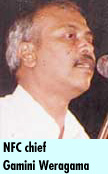 |

16th May 1999 |
News/Comment| Editorial/Opinion| Business| Sports | Mirror Magazine |
The new
National Film Policy will end the monopoly of the NFC. Good films are on
the way
Coming soonBy Feizal SamathIn the 1960s and early 1970s, Sri Lankans were fortunate to watch classic English movies of an older era like "Cleopatra", "My Fair Lady" or "The Ten Commandments". Families thronged to watch good quality movies those days. Cinemas were affordable and had comfortable seats and clean air from air conditioners,
not bug-infested seats or hot and stuffy interiors. conditioners,
not bug-infested seats or hot and stuffy interiors.
Once a place for family entertainment, cinemas showing English movies now draw mostly young people and unmarried couples interested in action and violence or a little privacy. Rising crimes in Sri Lanka, particularly against women and children, have been partly blamed on the violence shown in television and films. But the film and cinema industry, in the doldrums since the late 1970s when the state took over distribution of local and foreign films, is now preparing for revolutionary change after the government said it was abandoning its monolithic control. Last week, President Chandrika Kumaratunga's office announced a new National Film Policy, pronouncing some radical changes in the industry including the freeing of the sale, import and distribution of local and foreign films. "The changes are commendable and should see a marked turnaround in cinema in terms of quality and quantity," said Tissa Abeyesekera, an award-winning film director and writer. He said the government decisions were for the first time, realistic
and practical and had been taken in the context of changes in cinema all
over the world. But he emphasised the need for a team of While the local film industry is facing a crisis, cinemas have been dilapidated and rundown in the past several years, for many reasons. The quality of films imported through the state-run National Film Corporation (NFC) has been poor and mostly confined to sex and violence, with few quality movies. Local producers have had to confront high costs of production and poor quality equipment among other problems. The problems of the film and cinema industry have been well catalogued over the years. The industry and the NFC blame each other for the crisis. Politicians are also partly to blame for the problems, making use of film stars for political purposes and offering favours in return. Few serious or quality films have been produced in the country in recent times or imported from abroad. The lack of quality films or clean cinemas has compelled many Sri Lankans to watch television or videos in their living rooms. The security situation in the country has added to the reluctance of families to venture out at night to the cinema. The presidential statement on May 7 said that the new National Film Policy is intended to restore the industry to make it viewer-friendly and to ensure that cinema artistes are gainfully employed. It said the reforms would end the monopoly of the NFC in the distribution and import of both local and foreign films while also liberalising the laws and regulations governing the import and distribution of imported films. The NFC would henceforth function only as a regulator, monitor and formulator of rules for the industry. The other features of the new policy include concessionary government financing of up to 2.5 million rupees for colour films and 1.5 million rupees for black and white films, tax concessions for film producers, a reduction in the compulsory entertainment tax paid to local authorities and the levying of a Goods and Services tax only on box office collections. NFC General Manager Gamini Weragama confirmed that the policy had been approved by the cabinet but said the corporation was awaiting the cabinet paper to pursue any action. "Once I get the detailed proposal, I will forward it to the board of directors," he told The Sunday Times. Cinema owners hailed the new policy, but also hoped it would be properly implemented. "It's a brave attempt by the president to resurrect a dying business," said Imtiaz Cader, executive director of Ceylon Entertainments Ltd., owners of the classy Liberty Cinema in Colombo and some other theatres. He said the once profitable cinema business was now running up huge losses with Ceylon Entertainment Ltd. reporting a loss of one million rupees for the year ending March 1999. "It is a hand-to-mouth survival now." The number of cinemas in existence in Sri Lanka has come down sharply to 130 now from 365 in the 1970s when state controls, including the creation of the NFC, came into force. Cader, who is also treasurer of the National Film Exhibitors Association, said though the NFC had allowed the private sector to import some films since 1997 the tariffs were restrictive and major studios and distribution companies in the United States were not prepared to negotiate on these terms. "This meant private importers had to import from cheaper sources, resulting in a drop in quality," he said. Liberty and other high-class Colombo theatres like the Regal or Majestic were exclusive exhibitors of some of Hollywood's best movies and rarely showed a Sinhala film. Nowadays, they show a mix of Sinhala and English action movies. Hollywood blockbusters like the "Titanic" are yet to be released in Sri Lanka though they are freely available on video. Like many other cinema owners, Cader visualises exciting times ahead and his company has plans for two or three multiplex entertainment centres with three or four cinemas, food courts and other attractions in each complex. "We were prepared to invest in these centres about five years ago with foreign collaboration but it didn't work out at that time. We can revive these now since the industry has been freed of controls," he said, adding however that everything depended on the implementation of the new policy. Popular actress Veena Jayakody, who welcomed the President's initiative, attributed the poor state of Sri Lankan cinema due to high production costs. "It's very costly to produce a film nowadays and investors are getting into financial difficulties," she said. She said the cost of cinema tickets was also becoming prohibitive to the average family. "People can't afford to spend about 500 rupees on tickets per family." Some industry analysts say that the number of tickets sold in Sri Lankan cinemas has dropped to between 18 and 20 million a year from 80 million tickets in the late 1970s. They said top stars do less than one film a year now compared to a minimum of four to five, some years ago, reflecting the crisis in the local film industry. Many have also moved into acting in mini-drama series on television to survive. Film director Abeyesekera rejects the view that television and videos have affected cinema and led to lesser crowds, pointing to the success of the cinema in other countries against a much more vibrant television market. "We need to forge an alliance between films and television," he said. Cader from Ceylon Entertainment Ltd., echoed similar views, saying that television has not made inroads into the cinema business. "Rather it is that we have been supplying a poor quality product," he said. |
||
 |
Front Page| News/Comment| Editorial/Opinion| Business| Sports | Mirror Magazine |
|
 |
|
|
 committed
professionals to oversee this vital transformation in the industry.
committed
professionals to oversee this vital transformation in the industry.